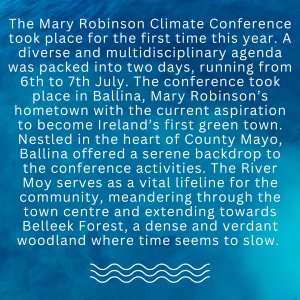Mary Robinson Conference Stresses Importance of Making Climate Change Personal and Urgent for Everyone

 By Rosalind Skillen
By Rosalind Skillen
The theme for the inaugural Mary Robinson Conference was ‘Communities Creating Change’. Hosted in Ballina Arts Centre, the conference brought together voices from all sectors of academia and society to share climate experiences and discuss local pathways for a sustainable future. Over the course of the two days, academics, eNGOs, community leaders, politicians and youth activists all shared their perspective on how we can fully embrace an economy based on social justice, clean energy and collective wellbeing.
However, at the conference, it felt like there was a genuine dilemma between participants about whether communities can indeed effectively create change. Is it too late to wait and bring people with us? Community engagement is vital, but consultations, pilot projects, and demonstrations should have been done 20 years ago. We now face the implementation stage, and large-scale transformation will inevitably require some level of disruption. With the hottest days ever in human history recorded last week, there’s no question that the sense of climate anxiety was palpable in the room. The fishery in the River Moy had to close last month because the river was too hot, and no salmon arrived in Spring. We are at great risk not only of making other species extinct, but also ourselves.
Speaking for the first time about his own fear in relation to climate change, Friends of the Earth Director, Oisín Coghlan, raised the need to be “constructively disruptive”. He publicly spoke about being “scared” and explained that “rational” reasoning in the climate emergency is not working fast enough. He raised the question of whether more non-violent direct action would diffuse this issue, suggesting that the activist movement will need a coordinated strategy of different types of actions to maintain political and social pressure on government.
One group who exerted and maintained pressure on the government were three youth climate activists from Fridays for Future Ireland. Jessica Dunne, Saoirse Exton and Magdalena Sedlmayr disrupted Eamon Ryan’s keynote speech, articulating their fear in the face of the threat of climate breakdown and reiterating their frustration at government inaction. Following their protest, Professor from Manchester University, Kevin Anderson, echoed a similar sentiment, explaining that we have been living in “cosy climate tales” for more than a third of a century. Anderson pointed to Ireland as an example of how to do climate action badly, adding that Ireland’s contribution to climate action has been to put emissions up. In Ireland, greenhouse gas emissions have risen by 22% since 1990s. By contrast, emissions have dropped by an average of 31% in Europe in the same time period. Although there are vast wealth inequalities within the country itself, Ireland is a developed country with far more financial capacity to decarbonise than many other nations.
Responding to the honest and stark expressions of outrage from many at the conference, former President of Ireland Mary Robinson said she was “glad” to hear angry voices. Speaking to RTE, she said, “I really liked when people were angry and speaking out”. Saoirse Exton, one of the UN Secretary General’s youth advisors on climate change, also felt anger was the only appropriate response to government failure to treat the climate crisis as a crisis. As an 18-year-old, Saoirse felt angry that the climate crisis was being treated as a future problem to bequeath to future generations, like her own. This sense of what we stand to lose from climate change was communicated in an art exhibition at the conference with visual displays of what aspects of our lives are threatened by climate breakdown. The exhibition raised questions about how we can even begin to put a value on things like air, water, nature and wildlife.
A key characteristic of climate change is that it is psychologically distant for most people. We believe that climate change only affects other people, nations and those born far into the future. We need to make climate change relevant to an individual’s locality and lifetime. Some of the projects in Ballina aim to do just that, with communities working together to change how they interact with the environment. The Ripple project in Greenhill estate was one of the prominent examples of how community in Ballina can respond to the climate and nature crises. A partnership between UCD and Mayo County Council, the Ripple project turned an underutilised green space in the Greenhill estate into an area for water resilient and productive climate action. The community worked with researchers to design a small community garden using art and architecture.
Where we all have responsibility to get involved in climate action in unique ways, the Mary Robinson Climate Conference made it clear that this responsibility is not equally distributed. There is no ‘universal we’ between countries or individuals within countries. Namely, those with wealth, power and decision-making capacity must create the policy framework to incentivise environmentally responsible behaviour and activities within and across communities. Our current policies mean a continuation of warming, or at best flattened emissions. Ireland is on track to achieve a 29% emission reduction, rather than the required 50 or 55%.
There is no doubt that the decisions that national government must make are challenging. However, it will be a lot more challenging to live in a 3 or 4 degree world. As Peter Thorne, senior author of the IPCC 6th Assessment Report, made clear, the stakes are high. Speaking at the conference, Thorne closed by warning that if we continue the way we are going, we will make the lives of future generations “a living hell”.







